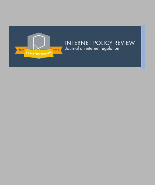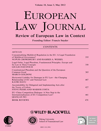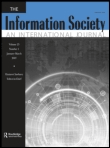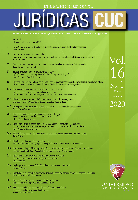
Internet Policy Review
Scope & Guideline
Advancing Knowledge in Internet Governance.
Introduction
Aims and Scopes
- Digital Governance and Regulation:
The journal extensively covers frameworks and policies related to internet governance, data protection, and the regulation of emerging technologies such as AI, emphasizing the need for transparent and accountable governance. - Platform Power and Accountability:
A core focus is on the influence of digital platforms on society, including issues of power dynamics, accountability mechanisms, and the implications of platform governance for content moderation and user rights. - Technological Impact on Society:
The journal explores how technological advancements affect social structures, human rights, and democratic processes, analyzing the socio-technical implications of digital innovations. - Interdisciplinary Perspectives:
It encourages interdisciplinary approaches, bringing together insights from law, sociology, political science, and technology studies to foster comprehensive discussions on internet policy. - International and Comparative Perspectives:
The journal highlights global perspectives on internet policy, comparing regulatory approaches across different jurisdictions and examining the implications of international governance frameworks.
Trending and Emerging
- Artificial Intelligence Regulation:
There is an increasing focus on the regulation of AI technologies, particularly in the context of the EU's AI Act, reflecting growing concerns about bias, transparency, and the societal impacts of AI. - Data Governance and Sharing:
Emerging discussions around data governance frameworks, including data sharing practices and data cooperatives, indicate a shift towards collaborative approaches in managing data as a public good. - Disinformation and Content Moderation:
The rise of disinformation has led to a growing body of work examining the effectiveness of platform policies and regulatory measures aimed at countering misinformation, especially in the context of political events. - Digital Rights and Human Rights:
There is a notable trend towards integrating digital rights into broader human rights discussions, emphasizing the importance of protecting individual freedoms in the digital age. - Cross-Border Digital Policies:
Emerging themes around cross-border digital governance highlight the complexities of regulating digital platforms that operate globally, focusing on the interplay between local and international laws.
Declining or Waning
- Decentralisation and Blockchain:
While decentralisation and blockchain technologies were once prominent topics, there has been a notable decline in articles addressing their implications, possibly due to the maturing understanding of these technologies and their integration into mainstream regulatory discussions. - Surveillance Technologies:
The focus on surveillance technologies has decreased, which may indicate a shift towards more nuanced discussions about privacy and data protection rather than a broad focus on surveillance itself. - Gender and Platform Economy:
Themes surrounding gender issues in the platform economy, while still relevant, have seen a reduction in frequency, suggesting a potential shift towards broader discussions of inclusivity and equity rather than gender-specific analyses. - Digital Scarcity and Ownership:
Discussions around digital scarcity and ownership of digital resources have waned, possibly reflecting a shift towards more pressing issues of data governance and user rights. - Historical Context of Internet Policies:
There has been a decline in historical analyses of internet policies, indicating a potential move towards a focus on current challenges and future regulatory pathways.
Similar Journals

MINNESOTA LAW REVIEW
Innovating Legal Perspectives for a Dynamic WorldMINNESOTA LAW REVIEW is a prestigious academic journal dedicated to advancing legal scholarship and discourse, published by the MINN LAW REVIEW FOUND in the United States. Established in 1976, this journal has become a cornerstone in the field of law, achieving an impressive Q1 ranking in the Law category for 2023, underscoring its significance and influence in legal studies, with a Scopus rank placing it in the 65th percentile among social sciences law journals. The ISSN number for both print and electronic editions is 0026-5535, ensuring broad accessibility to its scholarly contributions. With a commitment to publishing innovative and analytical articles that address contemporary legal issues, the MINNESOTA LAW REVIEW serves as an essential resource for researchers, students, and legal professionals seeking to deepen their understanding and engage with critical legal concepts. While it does not currently provide open access, its wide array of topics spans various disciplines within law, fostering a vibrant academic community dedicated to the exploration of legal principles and their applications. The journal’s editorial office can be found at 229 19TH AVE SOUTH, UNIVERSITY OF MINNESOTA, MINNEAPOLIS, MN 55455, where a team of experts curates content that reflects the evolving landscape of legal thought.

WASHINGTON LAW REVIEW
Advancing Legal Scholarship Since 1973WASHINGTON LAW REVIEW, published by the University of Washington School of Law, is a premier legal journal that plays an essential role in the dissemination of scholarly work in the field of law. With a longstanding commitment to excellence, this journal has been pivotal in shaping legal discourse since its inception. It is ranked in the Q2 quartile in Law, as per 2023 evaluations, and holds a notable position within the top 54th percentile of its category on Scopus. The journal’s extensive publication history, covering years from 1973 to 2024, provides a rich repository of legal scholarship, making it a valuable resource for researchers, practitioners, and students alike. While the journal does not currently offer open access, its authoritative articles cover a diverse array of topics within legal studies, ensuring that the most relevant and impactful discussions are accessible to the academic community and beyond. For those looking to stay informed about cutting-edge legal issues and advancements, WASHINGTON LAW REVIEW remains an indispensable asset in the pursuit of knowledge and advocacy in the realm of law.

Revista de Derecho Comunitario Europeo
Fostering Insightful Research on European Legal StructuresRevista de Derecho Comunitario Europeo, published by CENTRO ESTUDIOS POLITICOS CONSTITUCIONALES, serves as a vital platform for scholarly dialogue in the fields of Law, Political Science, and International Relations. Established in 2008, this esteemed journal focuses on the analysis of European Community Law, providing insightful articles that explore the dynamic intersection of legal frameworks and political science within the European context. Although currently categorized in the Q4 quartile for its fields, the journal is dedicated to enhancing its impact and visibility, particularly among researchers and practitioners interested in the evolution of European legal structures. While it does not offer open access, its rigorous peer-review process ensures the publication of high-quality research, making it a crucial resource for students and professionals aiming to deepen their understanding of contemporary legal and political issues in Europe. The journal's commitment to advancing scholarship in these areas is reflected in its ongoing publication through 2024, situated in Madrid, Spain.

European Law Journal
Navigating the evolving terrain of European jurisprudence.European Law Journal is a prestigious publication dedicated to the exploration and critical analysis of legal issues across Europe, offering readers timely insights into developments in law and their socio-political implications. Published by Wiley, this journal has established itself as an authoritative source in the field of law since its inception in 1995, successfully converging research and scholarship through 2024. With an impressive impact factor and ranked in the Q2 category for Law, it occupies a significant position at #235 out of 1025 in Scopus, reflecting its influence within the social sciences domain. While the journal is not Open Access, it remains a vital resource for researchers, practitioners, and students seeking to deepen their understanding of European legislative changes and jurisprudence. The European Law Journal invites contributions that challenge conventional perspectives and stimulate discourse on contemporary legal challenges, making it an essential read for those at the forefront of legal scholarship.

Revista Chilena de Derecho y Tecnologia
Unlocking New Perspectives on Law and Technology.Revista Chilena de Derecho y Tecnología is a distinguished open access journal published by Universidad de Chile, Facultad de Derecho, dedicated to exploring the interplay between law and technology in a rapidly evolving digital landscape. Since its inception, the journal has established itself as an essential resource for researchers, legal professionals, and students, facilitating critical dialogue and scholarship in this interdisciplinary field. With an impactful presence in the academic community, the journal has achieved notable rankings, including a Q1 classification in Law and a Q3 classification in both Computer Networks and Communications and Information Systems for the year 2023. Furthermore, the journal offers broad accessibility to its readers, having adopted an open access model since 2012, ensuring that cutting-edge research is available to a wider audience. Based in Santiago, Chile, the Revista Chilena de Derecho y Tecnología serves as a vital platform for advancing knowledge, fostering innovation, and responding to the legal challenges posed by emerging technological advancements, thereby contributing significantly to its respective fields.

Revista Juridica de Castilla y Leon
Advancing Legal Scholarship for a Global AudienceRevista Juridica de Castilla y Leon is a prestigious academic journal dedicated to advancing legal scholarship in the field of law and governance. Published by the JUNTA CASTILLA & LEON, CONSEJERIA PRESIDENCIA & ADM TERRITORIAL, this journal plays a vital role in disseminating high-quality research and foster dialogue among legal practitioners, researchers, and students alike. Since transitioning to Open Access in 2003, it has removed barriers to knowledge, allowing a global audience uncontrolled access to innovative legal studies and practices. With its ISSN 1696-6759 and E-ISSN 2254-3805, the journal is committed to publishing articles that address contemporary issues and challenges in the legal landscape, particularly those relevant to the Spanish context. As a reliable source for its readers, Revista Juridica de Castilla y Leon contributes significantly to the field of law, encouraging interdisciplinary research and collaboration to influence policy and improve legal frameworks in Spain and beyond.

Internet Research
Decoding the Internet's Influence on Society and EconomyInternet Research, published by Emerald Group Publishing Ltd, stands as a pivotal peer-reviewed journal in the domains of communication, economics, and sociology. Established in 1991, it has continually advanced the understanding of how the internet influences human interaction, economic behaviors, and sociopolitical structures. With impressive ranking achievements, including Q1 status in Communication, Economics and Econometrics, and Sociology and Political Science, the journal is recognized for its high impact, evidenced by its outstanding Scopus rankings—28th in Sociology and Political Science and 12th in Communication, highlighting its relevance and quality within the academic community. While the journal is not open access, its selective publication of landmark research attracts a dedicated readership of scholars, professionals, and students eager to explore the multidimensional impacts of the digital age. With a focus on innovative methodologies and empirical findings, Internet Research aims to foster scholarly discourse that shapes our understanding of the evolving online landscape through 2024 and beyond.

Tsinghua China Law Review
Fostering critical dialogue on pressing legal matters.Tsinghua China Law Review is an esteemed academic journal published by the Tsinghua University School of Law in China, dedicated to advancing the field of law through rigorous scholarly analysis and critical discourse. Established in 2019, this journal has carved a niche for itself within the legal community, striving to cover pertinent issues in Chinese law and its intersections with global legal trends. Although it retains an H-index disclaim and has discontinued its coverage in Scopus after 2024, it continues to provide a platform for innovative research and thought-provoking essays. Recognized for its contributions, it is categorized as Q4 in Law based on the latest ranking, positioning it at a pivotal juncture for emerging scholars aiming to make their mark within the legal scholarship landscape. With open access options limited, Tsinghua China Law Review remains a valuable resource for researchers, professionals, and students eager to engage with contemporary legal issues that shape society in an increasingly interconnected world.

INFORMATION SOCIETY
Navigating the Evolving Landscape of InformationINFORMATION SOCIETY, published by Taylor & Francis Inc, stands at the forefront of interdisciplinary inquiry, bridging the realms of cultural studies, information systems, and political science since its inception in 1981. With a commendable impact factor and recognized as a Q1 journal in multiple categories, including Cultural Studies and Management Information Systems, it serves as a pivotal platform for researchers, professionals, and students seeking insights into the ever-evolving dynamics of information in society. The journal, indexed by Scopus and ranked highly in various disciplines, not only highlights key theoretical developments but also addresses applied practices in information management within cultural and political contexts. While access is subscription-based, the journal’s impact and relevance ensure it remains essential reading for those engaged in the critical exploration of information's role in contemporary and future societies.

Juridicas CUC
Championing Quality and Accessibility in Law ResearchJuridicas CUC, published by UNIV COSTA, is a distinguished open-access journal dedicated to the field of Law, prominent since 2011. With an ISSN of 1692-3030 and an E-ISSN of 2389-7716, this journal serves as a vital resource for researchers, professionals, and students in Colombia and beyond. It holds a commendable Q2 status in Law for 2023, and its Scopus ranking places it at #425 out of 1025 in Social Sciences _ Law, reflecting its commitment to high-quality scholarship, evident in its 58th percentile. The journal aims to foster academic dialogue by publishing innovative and impactful research, contributing to the advancement of legal studies in a global context. Located in Barranquilla, Colombia, Juridicas CUC is committed to enhancing accessibility to legal research, ensuring that scholars from various backgrounds can engage with contemporary legal issues effectively.